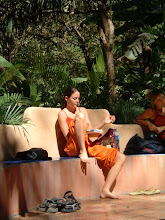It is helpful to step back and remember that you are not the only one struggling to shoulder a full outer life with a calling inward. Often, though we go to bed with the best intention to wake early to spend time on the mat or cushion, or we vow to find time after work or before the kids get home to head to the studio, we don’t do it. Days, weeks, months go by and as each pass our inner critic becomes louder. We tell ourselves, “I’ll never be good at yoga. Everyone else is a dedicated student but me,” or the ultimate blow, “I’ll never be enlightened!” We begin to believe that there is something wrong with us at our core, that we are flawed for not being able to make the time to practice.
Indeed, Patanjali states in the Yoga Sutras that laziness, carelessness, and fatigue are among the obstacles along the path of yoga. But are we truly lazy when we are managing children, a home, family, a career, hobbies, and a path of practice? For most of us, our lives are far from those of the renunciates who have given up worldly engagement for spiritual devotion; nor are we those with privileged amounts of time and resources to spend our mornings in meditation, our afternoons on the mat and our weekends on retreat. We are those who are simply striving to understand the Self while having both feet firmly planted in day-to-day demands. We are Householders.
In Hinduism, the culture from which yoga emerged, there are four distinct stages of human growth and development. These stages govern the flow of the maturing being and provide a guideline for advancing through the inner and outer worlds.
These Stages, or Ashramas, are:
1. The Student Stage - Brahmacharya
2. The Householder Stage - Grihastha
3. The Hermit Stage - Vanaprastha
4. The Wandering Ascetic Stage - Sannyasa
The Student Stage lasts until roughly the age of 25. It is a time of learning and study during which you prepared for a future profession and begin to understand the social and spiritual beliefs of your culture.
The Stage of the Householder, which lasts from approximately 25 – 50 years of age, is a period of being an active member of the community. You may be a partner, raise a family, support important causes, and pursue a career, all the while continuing to foster your relationship to spirit. Except for those who embark upon the life of a monk, nun, saint or saddhu, spiritual pursuits are not expected to be the central focus. All societies need productive, active Householders. You are laying the groundwork for the culture that will support your needs as you age, as well shape the world your children will inherit.
In the Hermit Stage you withdrawal from the material world into retirement. Here you are a grandparent and mentor, and are free to further deepen your bond with God or the Absolute. It is a time when a person is in this world but not of it. Today, this may not happen until the age of 60 or later.
The Fourth Stage is one of complete renunciation. Here, all efforts are turned towards uniting the individual soul, jivatma, with the universal Godhead, the paramatam. Only once a full life has been led do you concentrate solely on your spiritual path.
Though your soul longs to merge back into the spiritual ocean from which it came, it doesn’t all have to happen now. What you can do and control is how you feel about where you are. The next time you begin to beat yourself up over not having enough time on the mat, rest assured that all is coming. You are exactly where you need to be, doing exactly what you need to do.
Remember to be compassionate with yourself and have patience with your process. Your true Self is eternal, and you are destined to return there. Instead of wishing away the demands of everyday life, feel gratitude for the enlivening variety of experiences they offer. Each moment we have a choice to see the beauty before it passes, and when we do, we are truly living the path of yoga.




















No comments:
Post a Comment